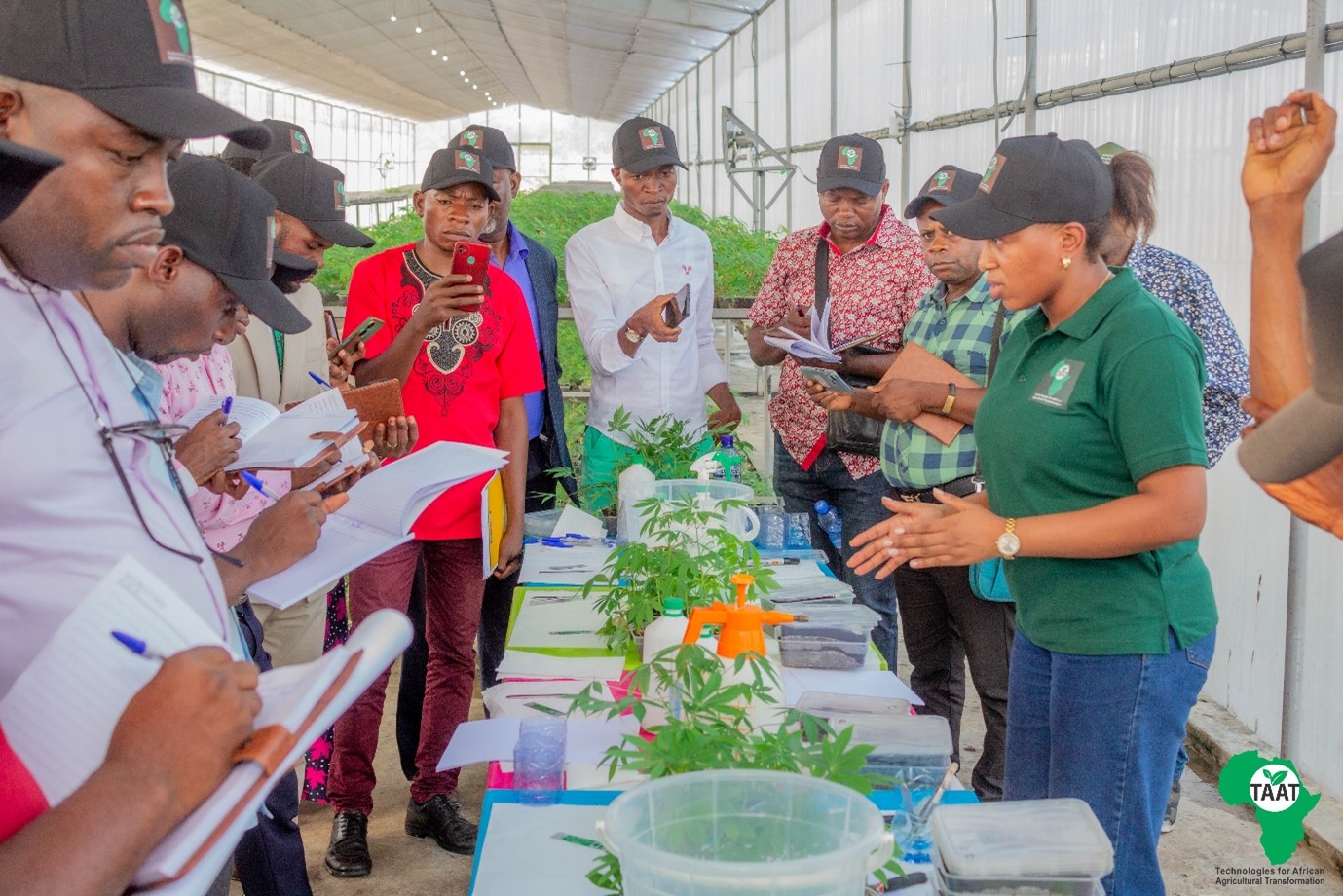DR Congo: TAAT engages Stakeholders on SAH Technology and Innovation Platform Approach
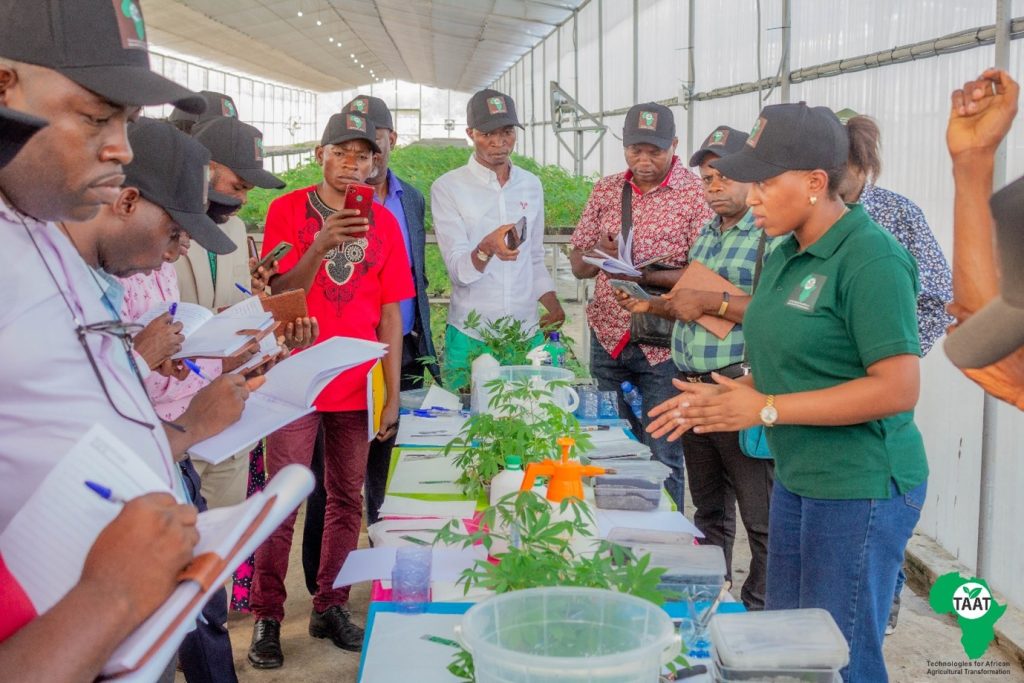
A broad spectrum of stakeholders in the Democratic Republic of Congo have undergone a specialised capacity-building programme on the Semi Autotrophic Hydroponics (SAH) technology and Innovation Platform approach for cassava seed production and commercialisation. The programme, which comprised training sessions, seminars and practical sessions, held from 10 to 12 October 2023 at the Centre de Recherche en Agrumiculture (CERAGRU) in Kinshasa, Democratic Republic of the Congo (DRC).
Organised by the Technologies for Africa Agricultural Transformation (TAAT) through the Cassava Compact led by the International Institute of Tropical Agriculture (IITA) and the Capacity Development and Technology Outreach (CDTO) Compact led by the Forum for Agricultural Research in Africa (FARA),the programme enhanced the capacity of national agricultural research and extension officers, seed regulators, youth and women groups on the SAH technology for rapid propagation of cassava planting materials. The sessions equally improved participants’ knowledge and skills in agricultural technology delivery mechanisms to provide quality services to farmers.
The 23 participants (87% male and 13% female) who were drawn from the Ministry of Agriculture (MINAGRI), National Agricultural Study and. Research Institute (INERA), and Non-Governmental Organisations (NGOs), learnt how cassava seed growers could use the SAH technology to produce large quantities of high-quality foundation seeds quickly. According to Dr Adebayo Abass, the TAAT Cassava Leader, this is critical for establishing a formal seed system for cassava in any country to achieve increased yields and improved food and nutritional security. “The training was tailored to capture critical elements that ensure rapid cassava seed production, good yield, clean and true-to-type materials, and the requisite quality standards,” he added.
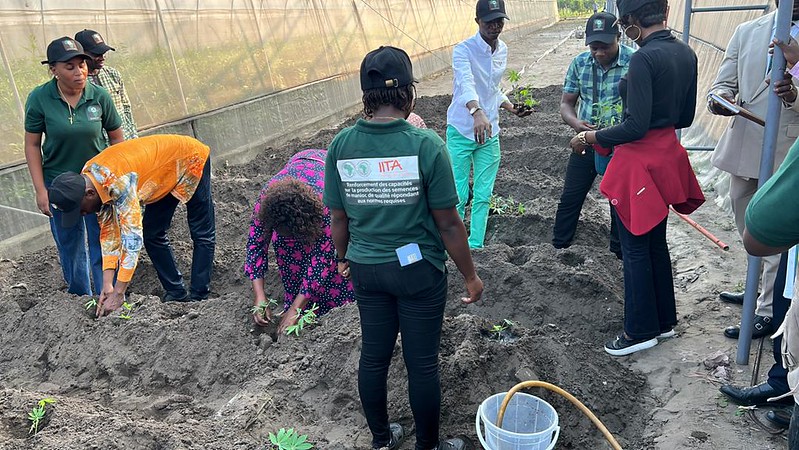
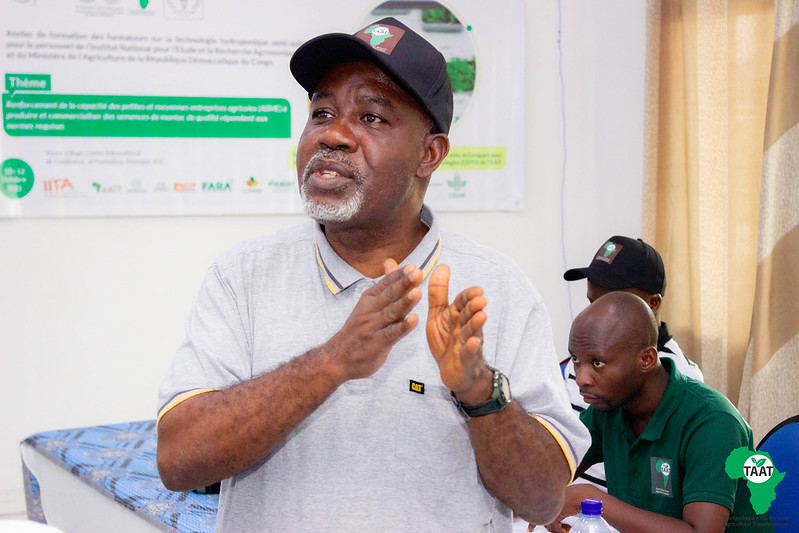
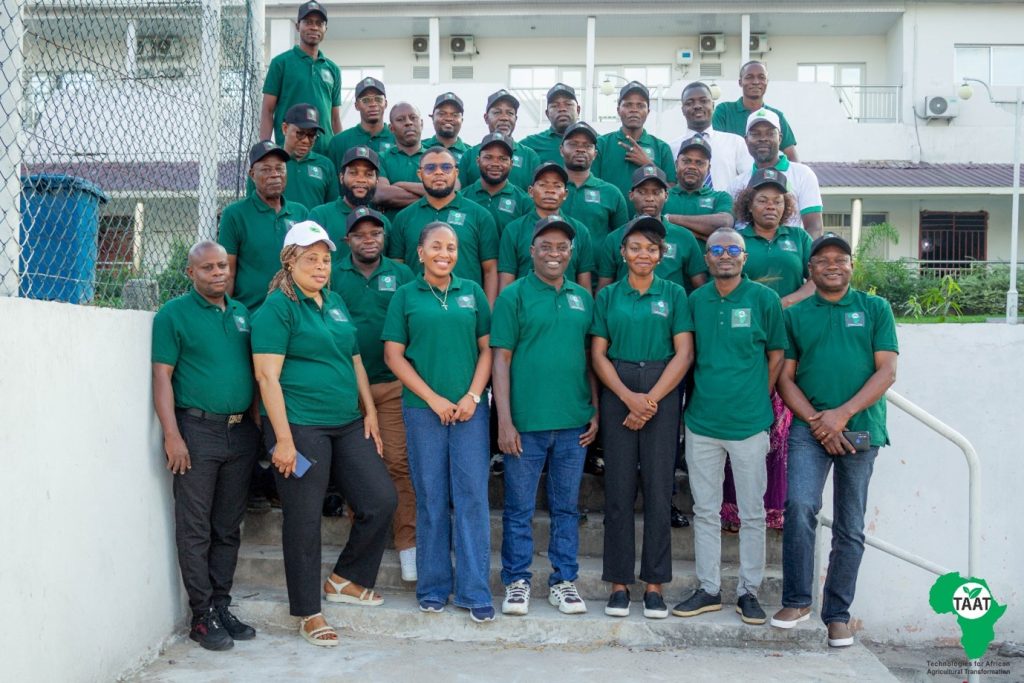
https://www.flickr.com/photos/taatafrica/albums/72177720311889097/page3
Dr. Abdulrazak Ibrahim, the TAAT CDTO Leader, stated that the capacity strengthening programme is aligned with FARA’s Innovation Platform (IP) framework, which strategically deploys IPs as operational tools to advance the goals of the Feed Africa Initiative within the Integrated Agricultural Research for Development (IAR4D) framework. “The CDTO Compact supports all TAAT commodity compacts by strengthening capacities and accelerating technology outreach. IPs are platforms that bring together stakeholders from different sectors to share knowledge, learn from each other, and develop innovative solutions to agricultural challenges,” he said.
Dr Ibrahim further added that the CDTO Compact works with the Cassava Compact to strengthen the capacity of institutions in selected countries, including the DRC, to better support the farmers and other cassava value chain actors in improving market access and profitability. “This includes targeted capacity building to equip the actors with the skills needed to establish and operate IPs in the cassava value chain, thereby contributing to the overall development of the value chain in Africa,” he added.
The training began with a pre-evaluation of the participants’ expectations, articulated across different areas, with a priority on gaining the requisite knowledge that will strengthen farmers’ and the private sector’s capacity to use the SAH technology and utilise innovation platforms to promote the cassava seed business. Participants demonstrated a comprehensive understanding of the cassava value chain in the country.
The three-day programme seamlessly integrated a diverse range of learning experiences. This included classroom presentations covering SAH technology, Cassava Business Connect (CBC) and Seed Tracker applications for promoting market linkages and tracking of seeds, respectively. The training also included learning how IPs function, Agribusiness Learning Alliance (ABLA) concepts, market-led growth, investment opportunities, development of business models, value chain actor mapping, knowledge management and outreach strategies for scaling technologies. A short session was dedicated to developing a cassava seed roadmap or seed system development strategy.
Trainees were engaged in the technical steps for producing the SAH plantlet (baby manioc) in the screen house and how to maintain the baby manioc on the field to produce virus-free and true-to-type commercial stems. Plenary discussions deepened participants’ comprehension of the seed production technology, the associated innovations, and the principles and practices of cassava seed production.
Participants participated in group work and engaged in interactive exercises throughout the workshop to ensure active learning and knowledge retention. They also received additional resource materials, case studies, and templates for reference and practical use. Participants engaged in hands-on activities such as preparing pits and other materials, multiplying the SAH plantlets (cutting), managing screenhouse operations, preparing the land, managing SAH nurseries, practising integrated soil and water management techniques, pests and diseases control, quality control, seed harvesting, and addressing regulations and marketing.
As the programme wrapped up, a comprehensive post-training assessment provided valuable insights into the overall effectiveness of the workshop. Participants gave positive sentiments, expressing satisfaction with the training’s progress and the SAH technology session. The trainees emphasised that the training effectively filled knowledge gaps with new insights into cassava seed production, the cassava value chain in general, and the operation of innovation platforms. Some participants from the MINAGRI pledged to advocate for the widespread adoption of SAH technology in the DRC.
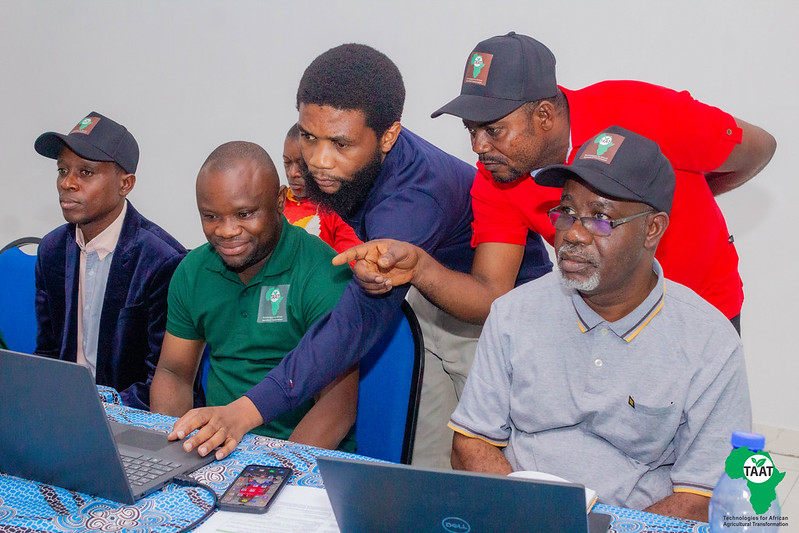


https://www.flickr.com/photos/taatafrica/albums/72177720312231366/page2
However, it was observed that some participants (36%) did not have farmers under their supervision, indicating potential areas for future engagement, such as connecting them with extension officials in the various DRC provinces to train. These extension officers will be well-positioned to support the seed farmers. Overall, the evaluations highlighted the training’s success in transferring knowledge and generating excitement among participants, setting the stage for potential ripple effects in promoting innovative agricultural practices in DRC.
The Leaders of the Cassava and CDTO compacts provided expert guidance throughout the training alongside a team of seasoned trainers and facilitators from IITA and FARA, which comprised Angelique Kajibwami, Dr. Apollin Fotso, Dr Badara Gueye, Benjamin Abugri, Doline Matempa, Karen Munoko, Dr. Najimu Adetoro, Dr. Sikirou Mouritala, Dr. Tony Bakelana, and Victorine Mbombo.
The capacity-building programme held as a deliverable for the Transition Support Fund (TSF), an initiative of the African Development Bank (AfDB) that is driving private sector and institutional development for substantial increases in agricultural productivity. With four key components, it focuses on creating an enabling environment, establishing Regional Technology Delivery Infrastructure (RTDI), deploying Appropriate Agricultural Technologies (DAT), and effective program management.
The enabling environment component, fostering sustainable agricultural transformation, builds support for Agricultural Small and Medium-Size Enterprises (ASMEs) in Good Agricultural Practices (GAPs), collaborates with institutions, and complements the RTDI and DAT components of TSF. RTDI identifies and deploys technologies aligned with Feed Africa objectives, strengthening IP networks. In tandem, DAT connects technology providers, farmers, and marketers, supporting technical assistance programs and creating a digitally connected network for comprehensive ecosystem establishment.


